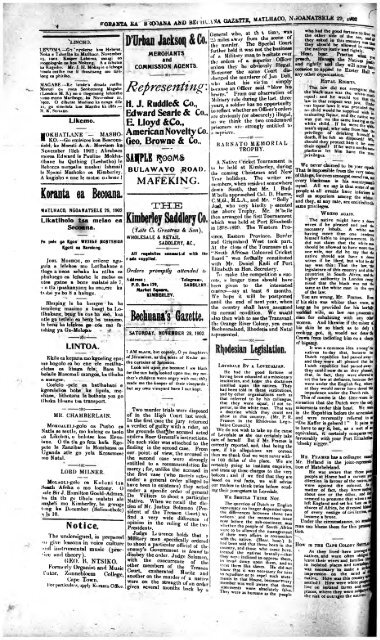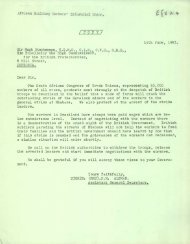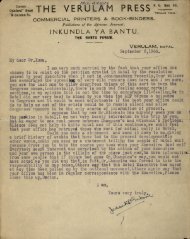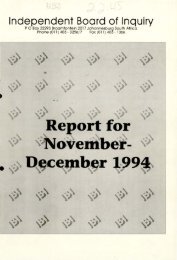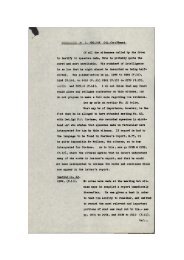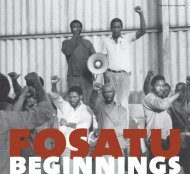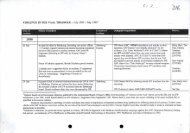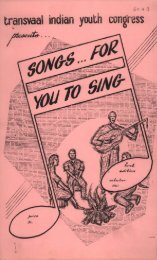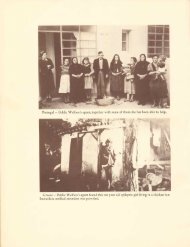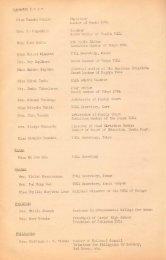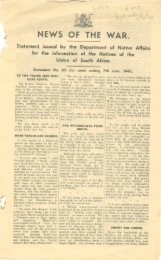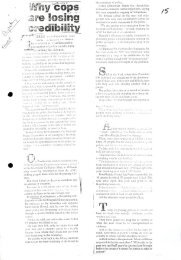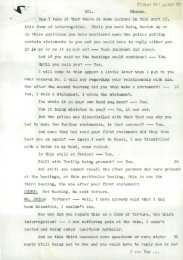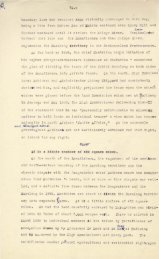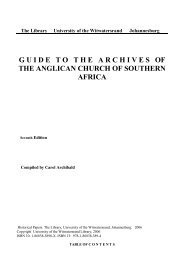A979-I1-1b-03-jpeg.pdf - Historical Papers
A979-I1-1b-03-jpeg.pdf - Historical Papers
A979-I1-1b-03-jpeg.pdf - Historical Papers
Create successful ePaper yourself
Turn your PDF publications into a flip-book with our unique Google optimized e-Paper software.
I . E 'v O M V — G*) 'n y e le ts e kna H e b ro n ,<br />
N o k a e T k h e tlh a ka M atlh aco , N o v e m b e r<br />
15, 1002. K a s p e r L e k o m a . m o ig i eo<br />
1norok>golo oa k oa N o k e n g . A a ikhutse<br />
ka K a g isho. M r . J . H . M o hapie o leboga<br />
litsala c o tlh e tse li thu&it&eng m o tire -<br />
lo r g ea p hitlh o.<br />
M A G A B E . — K e la to le a dit&ala cotlhe<br />
M o ru ti o< ro n a Seoketseng Magabe<br />
(L o n d o n M . S .) e o o tlogetseng lehatsho<br />
y e o o m o n o M a rib o g o , ka N o v e m b e r 31,<br />
1902. O dihetse M o d i m o ka nvaga dite<br />
2i , g o sim olola lu n M a n th c ka 1881.—<br />
K . K . S f.oako .<br />
L ikem o.<br />
I OKHATLANE — MASHO<br />
KO.—Go emiaicoe koa Beaconsrield,<br />
ke Moniti A. A. Morrison ka<br />
November I2eli 1902; Abraham<br />
moroa Edward le Paulitie Mokharlhane<br />
ba Quthing (Leshotho) le<br />
Rebscca moroalia moshui Ishmail<br />
le No*mi Mashoko oa Kimberley.<br />
A kagisho e one le motse 0 1 bone !<br />
Koranta ea Becoana.<br />
MATLHACO, NGOANATSELE 29, 1902<br />
Likatlholo tsa melao ea<br />
Secoana.<br />
Pa pele ga KB0* WESEfcE HOHTSHIOfl<br />
Kgosi ea Barolong.<br />
J o k l M o s h o u , eo erilenjr ngogula<br />
a lelekoa mo Lotlhakane n<br />
tloga a neoa aehaka ku ntlha ea<br />
phuluego ea lefatshe le melao ea<br />
ntoa gatoe a bone malatsi ale 7,<br />
1o tla ipsiakanyan” ku one,ere ka<br />
t* itai ya bo 8 a hnluge.<br />
Shuping le ba b m ig o e: ba ba<br />
lemileng masimo a baagi ba Lotlhakane,<br />
bcng ba one ba aeo, koa<br />
ntle ga tetlelo ea bfcrig l»a masimo,<br />
le bone ba lelekoa go ctfa mo faulting<br />
ya Ga-Molopu* r-. nl<br />
___<br />
... vjA r*A7ii'TTiE MATLHACO. NviOANATSKLB 20. itfOS<br />
R O B A N T A E A B ’C O O A M A A M D B E . H L A S A G A Z M T K , . a w g ____<br />
L IN T O A .<br />
I AM BLACK, but cojnely, O ye daughters<br />
Ekile ea kopana mo kgoeling epo; of Jerusalem, as the.^ehts of KeJar anc<br />
me bogolo ea bo ene ele metlha- the curtains of Salomon.<br />
cletaa ea libaga fela; Bare ba Look not upoB^/ne because 1 a m black<br />
bolaile Masonmli mangoe, ba tlhaba for the sun hath* looked upon me; my mother’*<br />
children were angry with me; thl*\<br />
h mangoe.<br />
Coelelo -pele ea batlhabani e made me the keeper of their vineyards ;<br />
kgorelelioa bobe ke lipnla, me- but my own vineyard have I not kopt.<br />
*haoa, lithotana le bothata yoa go<br />
tlhoka liloanu tsa transmit. *<br />
MR. CHAMBERLAIN.<br />
MoKOALEi.i-golo oa Pnsho ea<br />
Natla se seutlc, mo kaleng ea taolo<br />
va Likoloni, o bolotae koa Enyeiune.<br />
0 tla tla go feta kafa Egepete<br />
le Zanzibar le Mombassa oa<br />
Uganda atle go yela Kresemesc<br />
mo Natal.<br />
LORD MILNER.<br />
MoLAOi.i-golo oa Koloni tsa<br />
.Soath Afrika o mo loetong. O<br />
.ale Sir J. Hamilton Goold-Admos,<br />
ha tla tla go tlhola malatsi ale<br />
mabeli mo Kimberley, ba goroge<br />
teng ka December (Seliiuothole)<br />
a le 10.<br />
'<br />
Notice.<br />
The undersigned, is prepared<br />
•■> give liaisons in voice culture<br />
• nd instrumental music (pracfiee<br />
and theory).<br />
GEO. II. NTSIKO.<br />
Formerly Organist and Music<br />
Tutor, Zonncbloem College,<br />
Cape Town.<br />
For particula's, .tpj‘lv Koranta Office.<br />
MEROHANTS<br />
and<br />
COMMISSION AGENTS<br />
Representing'.<br />
H. J. Ruddle& Co.,<br />
Edward Searle & Co.,<br />
E. Lloyd &Co.,<br />
American Novelty Co.<br />
Geo. Browne & Co.,<br />
SAIfPLE I$00M§><br />
BULAWAYO iROAD.<br />
M A F E K IN G .<br />
T H E<br />
(fxite Cy Greatrex & Son),<br />
WHOLESALE & RETAIL<br />
SADDLERY, AC.,<br />
All req B isite s coasectcd with the<br />
rade supplied.<br />
Order8 promptly attended to.<br />
Address;<br />
P.O. Box 179.<br />
Market Square,<br />
KIMBERLEY.<br />
Telegrams,<br />
SADDLtKY<br />
Bechuana's Gazette.<br />
SATURDAY, NOVEMBER 29, 1902.<br />
Two murder trials were disposed<br />
of in the High Court last week.<br />
In the first'case the jury returned<br />
a verdict of guilty with a rider, on<br />
the grounds thatjthe accused acted<br />
under a Boer General's instructions.<br />
No such rider was attached to the<br />
finding in the second case. From<br />
our point of view, the accused in<br />
the second case were stronglv<br />
entitled to a recommendation for<br />
mercy ; for, unlike the accused in<br />
the first case (who merelv net<br />
under a general order alleged to<br />
have been in existence) thev acted<br />
under a specific order of general<br />
De \riliere to shoot a particular<br />
Native When we recall the die<br />
tion of Mr. Justice Solomon (Pre<br />
sident of the Treason Court) wt<br />
find a very wide difference of<br />
opinion in the ruling of the two<br />
President*.<br />
Judge Liurence holds that a<br />
Military man specifically ordered<br />
to shoot a particular ofHc:iu] of the<br />
enemy’s Government is bouvd to<br />
disobey the order. Judge Solomon<br />
with the concurrence of the<br />
other members of the Treason<br />
Court, exonerated liaritz and<br />
another on the murder of a native<br />
were on the strength of „n or.hr<br />
given several months buck by<br />
General who, at th t tiro?, was<br />
U.'i miles away from the scene of<br />
the murder. The Special (xairt<br />
further held it was not the business<br />
of a Military man to hesitate over<br />
the orders of » superior Officer<br />
unless they he obviously illegal.<br />
a W<br />
Moreover the same Cimrt disehnrged<br />
the murderer of Jau Doll,<br />
who shot his vicim _ simply<br />
becanse an Officer said “blow his<br />
brains.” From our observation 01<br />
Military rule duriug the last three<br />
vears, a soldier has no opportunity<br />
to reflect whether an Officer's onlers<br />
are obviously (or obscurely) illegal,<br />
we think the two condemned<br />
prisoners are- strongly entitled to<br />
reprieve.<br />
BARNATOMEMORIAL<br />
TROPHY.<br />
A Native Cricket Tournament is<br />
to be held at Kimberley, during<br />
the coming Christmas and New<br />
Year holidays. The writer re"<br />
members, when resident somewhere every blackman ia hia oountryaan’.<br />
equal. All we say is that w»me of oor<br />
down South, that Mr. I. Bnd- people at all events have inferiors *<br />
M’belle approached Col. D. Harris, well as superiors among the white? -<br />
C.M.O., M.L.A., and Mr. “ Solly" and they, at any rate, are entitled to U* !<br />
Joel, who very kindly p esented same privileges.<br />
the above Trophy. Mr. M’belle<br />
_ . W n O N O AGAIN.<br />
then arranged tne first Tournament<br />
which was held at Port Elizabeth The native might have a dota i<br />
wives if he pleased and paid the 1<br />
in 1808-i809. The Western Province,<br />
Eastern Province, Border having more than one rendered '<br />
necessary lobola. A white ma<br />
himself liable to imprisonment He<br />
and Griqualand West took part. did not claim that the white na I<br />
At the close of the Toumam«nt a should be allowed to have more thu<br />
“ South African Coloured Cricket one wife, nor did he say that tbe<br />
Board" was forihally constituted native should not have a dozea<br />
wives if he liked, but what he ii<br />
with Mr. Daniel Kadi of Port say was this: That the law.Tfe<br />
Elizabeth as Hon. Secretary.<br />
legislature of this country and all the<br />
To make the competition a success,<br />
a longer time should have higher authority in London recog<br />
countries in South Africa, andtkc<br />
been given to the interested nised that the black was not the<br />
same as the white man in the era:<br />
centres—say at least 6 months. of the law.<br />
We hope it will be postpone*} You are wrong, Mr. Frames. Em<br />
.until the end of next year, when if his skin waa whiter than «k>», b<br />
the country shall ha ve_ assumed long as he provided for his lawfofc<br />
its normal condition. We would wedded wife, no law can pit*ecnte»<br />
also then wish to see the Transvaal, man for cohabiting with any other<br />
the Orange River Colony, yea even women. And likewise if the colour of<br />
Bechuanaland, Rhodesia and Natal<br />
represented.<br />
L ovedale By a LovErAUAi?.<br />
He had the good fortune of<br />
having been educated at a missionary<br />
institution, and knew the doctrines<br />
instilled upon the natives. They<br />
had been told in these institutions,<br />
and by other organisations such as<br />
that referred to by his colleague,<br />
that they were equal, if not superior,<br />
to the white man. That was<br />
a doctrine which they could not<br />
allow in this country. (Mr. P. R.<br />
Frames in the Rhodesian Legislative<br />
Council.)<br />
We do not wish to take np the cause<br />
of Lovedsle as she can certainly take<br />
care of herself But if Mr. Frames ib<br />
correctly reported, and, that being the<br />
cane, if his allegations are correct<br />
then we thank God we were never within<br />
100 milea of the place. We are<br />
certainly going to institute enquiries,<br />
and trace up these charges to the very<br />
bottom ; and if we find that thev are<br />
l>ased on na! facta, we will advise<br />
our reader* to think twice before sending<br />
their youngster* to IiQvedale.<br />
W k Should T hink Nor.<br />
The question of Dutch or English<br />
supremacy no longer depended upon<br />
the differences between those two<br />
nations: and the momentous issue<br />
now before the sub-continent was<br />
whether the people of South . Africa<br />
m ere to be allowed the management<br />
of their own affairs in connection<br />
with the native. (Hear, hear.) It<br />
had been said that those born in the<br />
mtry. and those who came here<br />
treated the natives brutally—that<br />
m ’trST, to °P P "» them,<br />
* do,^n upon them, and to<br />
treat them like slaves. He did not<br />
know that it was necessary for him<br />
to repudiate or to repel such statements<br />
in that House, becauseTnery<br />
»»?re tha. ,ho£.<br />
statement* were sbjoUu,.]). frw.<br />
1 he) were as humane as the people<br />
who had the good fonanc<br />
the other s.de of lht w , ' «<br />
they asked in this countVj .-Jf?,*-<br />
they should be altowed i,, * ^<br />
the natives justlv and rightu ^ *<br />
Hear, hear. Practise , L „<br />
r s i S l S y S<br />
occasion to appeal to Eieter HidTH<br />
any other organization.<br />
E qual R ights.<br />
, J aw not recognise<br />
the black man was the white,<br />
equal: and he would saV<br />
law in that respect was just n j r<br />
our liquor laws it was provided a<br />
no child would be supplied<br />
toxieating liquor, and the native<br />
P « .«» am t footing<br />
white child. If he were the wKm<br />
rnaa s equal, «hr takt from h i -<br />
P1" ° / , drinking himsdf t<br />
death, if he felt so djsposed’ \n<br />
should they protect him it he<br />
theireqoaf? If he were o„lhe^<br />
platform let hun have the nT<br />
privileges.<br />
We never claimed to be vour pqnik<br />
That n impoesible fixnn the'very i n *<br />
of things, for even amongst oursoi ves, n«<br />
his skin be so black as to defj t<br />
cooking pot, it would not deter the<br />
Crown from indicting him ou a cbarp<br />
of bigamy.<br />
It was a common idea among''tie<br />
natives to-day that, because Oe<br />
Dutch republics had passed airarand<br />
they were all pleased that tk<br />
L'utch republics had passed aw«jthey<br />
could now do as they pleased;<br />
that, in fact, they were allowed tt<br />
set the law at defiance, because thet<br />
were under the English flag, whereas<br />
they would never have dared tte<br />
impudence under the Dutch rule.<br />
This of course ia the time-worn<br />
sinuation that tlie Dutch were tbe ooh<br />
miscreants under this head. We<br />
in the Republics before the anneaU*<br />
and were reverently referred to<br />
“Die Kaffer is geleerd ! ” It paiw<br />
to have to say it, but, as a sort of<br />
equivalent, it certainly compares rat<br />
favourably with your Port Elizabeth*<br />
‘cheeky nigger.”<br />
Mb. F kaxes has a colleague n «J<br />
Mr. Holland in the joiut-repreeenl*,<br />
tion of Matebeleland.<br />
He was aware that those<br />
people at Home had a curious ‘<br />
dilection in favour of the natire,<br />
were against the colonist. Ai<br />
matter of fact, they knew<br />
about one or the other, and<br />
seemed to presume that when *<br />
left England and set his foot oa<br />
shores of Africa, he divested hL<br />
of every vestige of civilizatioo,<br />
became a brute.<br />
Under the circumstance**, no<br />
man can blame them for this<br />
tion.<br />
How is th e Cape Colony Ski<br />
’ As they lived here amongst<br />
natives, and were often oblige<br />
leave their wives and families^—<br />
in isolated places and tows<br />
was necessary to make a -<br />
impression on the mind «<br />
native. HOw was this country"<br />
settled ? How were white paf*<br />
live on isolated farms and--<br />
places, where they were sub;--<br />
the risk of outrages the native*


